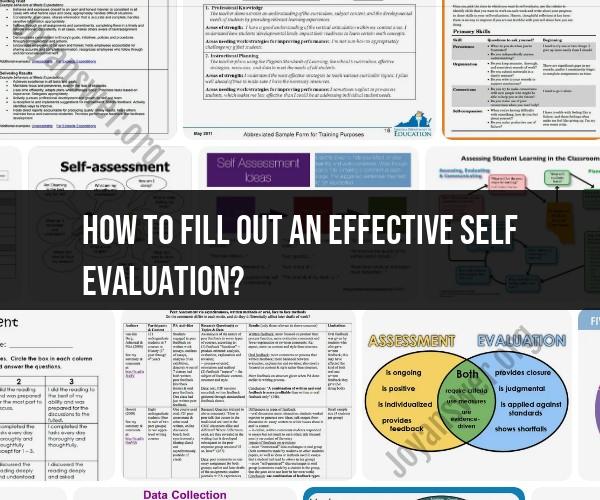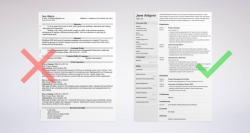How to fill out an effective self evaluation?
A self-evaluation is an important component of the performance appraisal process, as it allows employees to reflect on their own performance, achievements, and areas for improvement. To complete an effective self-evaluation, follow these comprehensive steps:
Before You Begin:
Review Your Job Description and Goals: Familiarize yourself with your job description, performance goals, and any specific objectives set for the evaluation period. Ensure you understand the expectations and criteria against which your performance will be assessed.
Gather Feedback and Documentation: Collect data and evidence related to your performance, such as key accomplishments, project outcomes, quantitative results, feedback from colleagues or clients, and any relevant documentation or work samples.
Reflect on Your Performance: Take time to reflect on your overall performance during the evaluation period. Consider both your successes and areas where you believe you could improve. Be honest and self-critical.
Writing Your Self-Evaluation:
Follow a Structured Format: Typically, self-evaluations have a structured format with specific sections or questions to address. If your organization provides a template, use it. Otherwise, organize your self-evaluation into sections like achievements, challenges, goals, and development areas.
Highlight Achievements:
- Begin with a section that highlights your key achievements and accomplishments during the evaluation period. Be specific and use data or examples to support your claims.
- Describe how your accomplishments contributed to the organization's goals or improved processes.
Acknowledge Challenges:
- Acknowledge any challenges or obstacles you encountered during the evaluation period. Explain how you handled these challenges and whether you sought assistance or solutions.
- Emphasize your ability to adapt and overcome difficulties.
Discuss Goals and Objectives:
- Review the goals and objectives set for the evaluation period. State whether you achieved them or made progress toward them.
- If you did not achieve certain goals, provide reasons and any lessons learned.
Identify Areas for Improvement:
- Discuss areas where you believe you could improve or develop further. Be specific about the skills, behaviors, or competencies you want to work on.
- Explain how addressing these areas will benefit both you and the organization.
Provide Evidence and Examples:
- Support your statements with concrete evidence and specific examples. Use metrics, project outcomes, and feedback to illustrate your points.
- Show the impact of your contributions through quantitative and qualitative data.
Demonstrate Alignment with Company Values:
- Discuss how your actions and behaviors align with the company's values, mission, and culture. Highlight your commitment to upholding these principles.
Self-Assessment and Reflection:
- Evaluate your overall performance and growth during the evaluation period. Consider how you've grown professionally, any new skills acquired, and how you've contributed to the team and organization.
- Share your perspective on your strengths and weaknesses.
Set SMART Goals for the Future:
- Outline specific, measurable, achievable, relevant, and time-bound (SMART) goals for the next evaluation period. These goals should address your areas for improvement and align with organizational objectives.
Be Concise and Clear: Write your self-evaluation in a clear and concise manner. Avoid jargon or excessive technical language. Use bullet points or subheadings for readability.
Stay Positive and Professional: Maintain a positive and professional tone throughout your self-evaluation. Even when discussing challenges, focus on solutions and growth.
Proofread and Edit: Review your self-evaluation for grammar and spelling errors. Ensure it is well-organized and flows logically.
Final Steps:
Seek Feedback: Before finalizing your self-evaluation, consider sharing a draft with a trusted colleague or mentor for their input and feedback.
Submit on Time: Ensure you meet the deadline for submitting your self-evaluation. Late submissions can reflect negatively on your commitment to the process.
Prepare for Discussion: Be ready to discuss your self-evaluation with your supervisor during the performance appraisal meeting. Be open to feedback and receptive to a constructive dialogue.
Remember that a well-prepared and thoughtful self-evaluation can contribute to a more meaningful and productive performance appraisal discussion. It also demonstrates your proactive approach to self-development and commitment to your role within the organization.
How to Write an Effective Self-Evaluation for Work
A self-evaluation is a written assessment of your own performance at work. It is an opportunity to reflect on your accomplishments, identify areas for improvement, and set goals for the future.
To write an effective self-evaluation, follow these steps:
- Start by reviewing your job description and performance goals. This will help you to focus your evaluation on the most important aspects of your job.
- Identify your accomplishments. Think about the projects you have worked on, the problems you have solved, and the contributions you have made to your team and the company.
- Identify areas for improvement. Be honest with yourself about the areas where you can improve. This may involve talking to your manager, colleagues, or customers.
- Set goals for the future. What do you want to achieve in your next performance review period? Set specific, measurable, achievable, relevant, and time-bound goals.
- Write your self-evaluation. Be specific and provide evidence to support your claims. Be honest and objective, and focus on your performance, not your personality.
- Have your manager review your self-evaluation. This will help you to ensure that your evaluation is fair and accurate.
Tips for Self-Assessment to Highlight Achievements
Here are some tips for highlighting your achievements in your self-evaluation:
- Be specific and quantify your accomplishments whenever possible. For example, instead of saying "increased sales," say "increased sales by 15%."
- Use strong action verbs to describe your accomplishments. For example, instead of saying "responsible for developing a new marketing campaign," say "developed a new marketing campaign that resulted in a 20% increase in website traffic."
- Focus on your results and the impact your work had on your team and the company. For example, instead of saying "managed a team of 10 employees," say "managed a team of 10 employees and achieved a 95% customer satisfaction rating."
Mistakes to Avoid on a Self-Evaluation
Here are some mistakes to avoid on your self-evaluation:
- Don't be too humble. It's important to be honest about your accomplishments and the value you bring to the company.
- Don't be too negative. It's okay to identify areas for improvement, but focus on the positive aspects of your performance as well.
- Don't make excuses. If you didn't meet a goal, explain why but don't make excuses.
- Don't attack others. Your self-evaluation should be about your own performance, not the performance of others.
By following these tips, you can write an effective self-evaluation that will highlight your achievements and help you to achieve your career goals.












